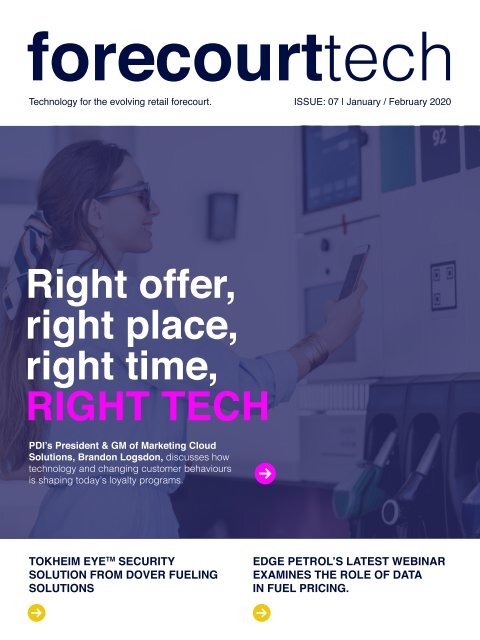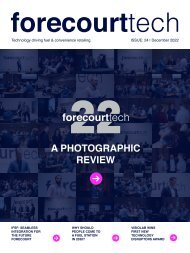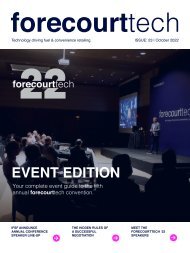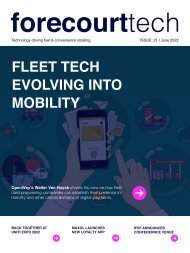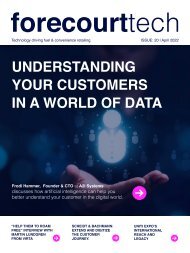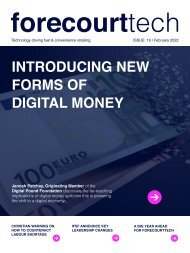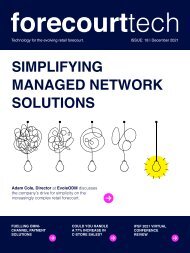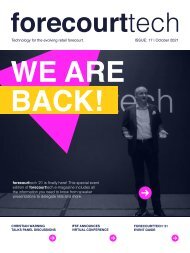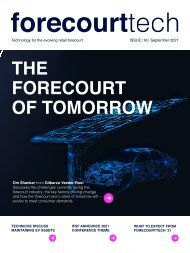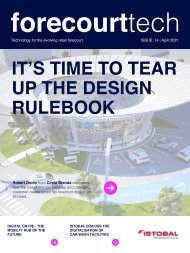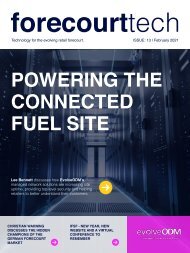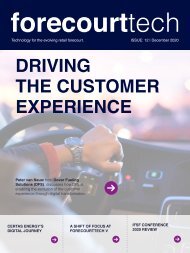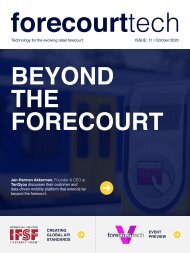forecourttech February 20
A bi-monthly technology magazine for the evolving retail forecourt.
A bi-monthly technology magazine for the evolving retail forecourt.
Create successful ePaper yourself
Turn your PDF publications into a flip-book with our unique Google optimized e-Paper software.
Technology for the evolving retail forecourt.<br />
ISSUE: 07 | January / <strong>February</strong> <strong>20</strong><strong>20</strong><br />
Right offer,<br />
right place,<br />
right time,<br />
RIGHT TECH<br />
PDI’s President & GM of Marketing Cloud<br />
Solutions, Brandon Logsdon, discusses how<br />
technology and changing customer behaviours<br />
is shaping today’s loyalty programs.<br />
TOKHEIM EYE TM SECURITY<br />
SOLUTION FROM DOVER FUELING<br />
SOLUTIONS<br />
EDGE PETROL’S LATEST WEBINAR<br />
EXAMINES THE ROLE OF DATA<br />
IN FUEL PRICING.
<strong>forecourttech</strong><br />
Editors note<br />
Happy New Decade!<br />
It’s strange to think that as we enter <strong>20</strong><strong>20</strong> most of the<br />
technologies that form part of our every day lives, were<br />
not available ten years ago.<br />
Uber, Instagram, contactless payments, wireless<br />
headphones, smart home devices, online shopping.<br />
Back in <strong>20</strong>09 none of these existed.<br />
If you’d told me ten years ago I could pay for fuel using<br />
my watch, that I could order fuel delivery to my home or<br />
that autonomous vehicles would be being piloted on our<br />
streets, I’m not sure I would have believed you.<br />
When I think about how far we have come in such a<br />
short space of time it excites me to think where we<br />
might find ourselves in the next ten years. Technology<br />
presents so many opportunities for this industry and I<br />
am excited to see what new technologies emerge and<br />
how we as an industry work together to take on the<br />
challenges and make the most of the opportunities that<br />
are presented to us.<br />
pagethree<br />
<strong>forecourttech</strong> will be back for its third outing from 6-7<br />
October <strong>20</strong><strong>20</strong> at the Asia Gardens Hotel & Thai Spa in<br />
Alicante, Spain. We are currently working hard behind<br />
the scenes on a number of exciting initiatives to ensure<br />
that the event remains fit for purpose and maintains it<br />
focus on the evolving retail forecourt.<br />
I look forward to being able to share the details with you<br />
soon.<br />
Enjoy the issue.<br />
Ed.<br />
The <strong>forecourttech</strong> brand is owned and<br />
promoted by SAB Events Europe Ltd. All<br />
rights reserved.<br />
The views expressed in this magazine are<br />
those of the author and do not necessarily<br />
represent those of SAB Events Europe. No<br />
part of this electronic magazine may be<br />
copied or reproduced without the written consent<br />
of SAB Events Europe Ltd.<br />
Advertising:<br />
Stephen Bozdan<br />
stephen@sabevents.eu<br />
Features:<br />
Wendy Taylor<br />
wendy@sabevents.eu<br />
SAB Events Europe Ltd.<br />
The Quadrant<br />
Surrey<br />
KT17 4RH<br />
www.sabevents.eu<br />
#<strong>forecourttech</strong> @<strong>forecourttech</strong> www.<strong>forecourttech</strong>.com
We’re gonna<br />
give you something<br />
to think about.<br />
Insights and inspiration<br />
from the world<br />
beyond your doors.<br />
NACS Convenience Summit Europe is the best way to<br />
grow your global business. Designed for senior-level<br />
executives from Europe and abroad, this event offers<br />
smart thinking on the global trends, technologies and best<br />
practices that are shaping the future of convenience and<br />
fuel retail. You’ll hear from some of the brightest minds<br />
within and outside our industry. Be ready to pivot, we’ll<br />
show you how.<br />
2-4 June <strong>20</strong><strong>20</strong> | Berlin, Germany<br />
Register today at<br />
conveniencesummit.com
THE ROLE OF<br />
DATA IN<br />
FUEL PRICING<br />
Finding the right pricing solution to match your<br />
business needs can seem like a bit of a minefield. In<br />
Edge Petrol’s latest webinar they help retailers to<br />
understand their options and discuss how they can<br />
unlock their business potential.
<strong>forecourttech</strong><br />
pagesix<br />
When it comes to the role data can play in fuel<br />
pricing, it is a one-size fits all approach. Different types of<br />
retailers have different objectives and will use different data<br />
sources to varying degrees.<br />
“Edge and our competitors are upgrading the use of<br />
data in the industry and, as a whole, that is beneficial for<br />
everyone. We want to show retailers what is possible with<br />
the right data and the right tools at your disposal,” explains<br />
Mark Truman, Chief Revenue Officer who was joined on the<br />
webinar by Nikhil Patel, Senior Sales Manager and Oscar<br />
Smith Diamante, Chief Editor at Petrol Plaza.<br />
To make things simple Edge Petrol, has identified four<br />
retailer stereotypes, based on their meetings with hundreds<br />
of different retailers. Each stereotype has different objectives<br />
and strategies and will use data to varying degrees in<br />
order to meet their goals.<br />
The Libero retailer is focused on volume and achieving<br />
high footfall. They achieve this by undercutting competitors<br />
and therefore need competitors pricing data in order to ensure<br />
their price is competitive. This is model is particularly<br />
popular with supermarkets where they are able to convert<br />
the footfall into dry stock sales.<br />
The Zlatan retailer, like the man himself, is a high roller.<br />
They have high margins and can maintain this because<br />
they are in low competition areas – think motorway service<br />
sites or stations in rural locations. The data they need<br />
is cost prices to ensure they are achieving the required<br />
margins.<br />
The Groundhog does not require much data at all because<br />
their prices rarely change, unless there are huge fluctuations<br />
in the market. Their focus is on brand perception and<br />
their time and this stereotype is often associated with small,<br />
busy retailers. While this system may be easier to run it also<br />
runs the risk of missing opportunities to maximise profits.<br />
The final stereotype is The Enganche, for those not familiar<br />
with the phrase, it’s an Argentinian footballing term used to<br />
describe a traditional playmaker. The playmaking retailers<br />
are focused on maximising profits using a whole range<br />
of data sets and is and ideal model for large or growing<br />
portfolios. Being the Messi of the petrol retail world does<br />
come with its risks however as inaccurate data, out of date<br />
insights and not being able to action quickly can significantly<br />
affect outcomes.<br />
Whilst each of these stereotypes differs drastically in<br />
needs, they all require some form of data in order to unlock<br />
their full potential. Once a retailer is able to identify their<br />
type it becomes much easier to source the products and<br />
services that they need.<br />
“If you don’t see value in these tools, your competition will,”<br />
added Mark. “Change is coming to the forecourt industry<br />
and those who don’t improve or adapt will be left behind.”<br />
Edge plan to expand on this first webinar and plan to run a<br />
panel style webinar with representatives from other pricing<br />
solutions providers with the primary goal of educating<br />
retailers: “anyone can sell a product to a company, but can<br />
you sell an idea to an industry? added Mark.<br />
The full webinar can be viewed below:<br />
#<strong>forecourttech</strong> @<strong>forecourttech</strong> www.<strong>forecourttech</strong>.com
<strong>forecourttech</strong><br />
THE LIBERO<br />
THE ZLATAN<br />
Cares about: Volume<br />
Common market type: Competitive<br />
Good system for: Strong dry stock offerings<br />
Data / insight required: Competitor pricing<br />
Benefits: High footfall<br />
Risks: Low / negative margins, low conversion to dry<br />
stock sales.<br />
Cares about: Margin<br />
Common market type: Rural / low competition<br />
Good system for: Prime real estate<br />
Data / insight required: Cosy prices<br />
Benefits: High margins<br />
Risks: Volume fluctuations / low shop sales<br />
pageseven<br />
THE GROUNDHOG<br />
THE ENGANCHE<br />
Cares about: Brand perception, their time<br />
Common market type: Varied<br />
Good system for: Small and busy retailers<br />
Data / insight required: Not much<br />
Benefits: Easier to run<br />
Risks: Leaving money on the table. Volume, margin<br />
and profit fluctuations.<br />
Cares about: Maximising profits<br />
Common market type: Varied<br />
Good system for: Large or growing portfolios<br />
Data / insight required: Volume, cost prices / margins,<br />
competitor pricing<br />
Benefits: Easier to run<br />
Risks: Inaccurate date/ out of date insight. Not being<br />
able to action quickly.<br />
#<strong>forecourttech</strong> @<strong>forecourttech</strong> www.<strong>forecourttech</strong>.com
<strong>forecourttech</strong><br />
News round-up<br />
Chrysler, Dodge, Jeep and Ram drivers will<br />
now be able to pay for fuel and services<br />
through Fiat Chrysler Automobiles’ FCAU<br />
UConnect Market at Shell-branded sites<br />
across the United States. The new e-commerce<br />
platform will help customers locate the<br />
nearest Shell fuel station and securely pay<br />
for fuel and services through their in-vehicle<br />
infotainment systems.<br />
More than half of taxi and Uber customers<br />
in Europe are willing to pay an extra 15-<strong>20</strong><br />
cents per kilometre for a zero-emission ride,<br />
according to a poll published by survey<br />
organisation YouGov today. 52% of people<br />
surveyed in seven European countries said<br />
they would spend the extra amount per km<br />
(0.6 miles) if their ride was in a vehicle that<br />
does not produce carbon emissions, such as<br />
an electric car.<br />
pagesix<br />
CAFU, the MENA region’s first on-demand<br />
fuel delivery app has entered into a fuel<br />
supply partnership with Al Maha Petroleum<br />
to deliver its popular services to customers in<br />
the Sultanate. CAFU is a fast, safe and easyto-use<br />
on-demand fuel delivery service app<br />
allowing customers to order car fuel at their<br />
own convenience.<br />
General Motors has confirmed it will invest<br />
$2.2 billion to convert an ageing Detroit assembly<br />
plant into the manufacturing heart of<br />
its “all-electric future.” The Detroit-Hamtramck<br />
Assembly Plant was one of five North<br />
American factories GM said it would close in<br />
November <strong>20</strong>18 but the automaker reversed<br />
course as part of an aggressive plan to<br />
launch more than <strong>20</strong> battery-electric vehicles,<br />
or BEVs, by <strong>20</strong>23.<br />
Food retail, wholesale and distribution company<br />
AF Blakemore has added fifteen of<br />
its UK Spar convenience stores to the food<br />
waste fighting app, Too Good to Go, which<br />
enables people to purchase short-dated food<br />
for a reduced price. The app, which was<br />
launched in the UK in June <strong>20</strong>16, was set up<br />
to help tackle the ten million tonnes of food<br />
wasted each year by saving the fresh and<br />
short-dated food often discarded by restaurants<br />
and retailers.<br />
#<strong>forecourttech</strong> @<strong>forecourttech</strong> www.<strong>forecourttech</strong>.com
<strong>forecourttech</strong><br />
Cruise, the autonomous vehicle division of<br />
General Motors has unveiled an ambitious<br />
new vehicle that its executives said was “the<br />
beginning of the future beyond the car.” The<br />
futuristic electric vehicle, the Cruise Origin,<br />
which has no steering wheel and seats six<br />
passengers, has a long road to travel before<br />
any passengers will be able to hail a ride in<br />
it. Cruise would not name a time frame for its<br />
availability.<br />
Total will install <strong>20</strong>,000 new public electric<br />
vehicle (EV) charging points, after winning<br />
Europe’s largest concession contract from<br />
Metropolitan Region Amsterdam Electric<br />
(MRA-Electric). The oil and gas company<br />
will install and operate the chargers in three<br />
provinces in the Netherlands: North-Holland,<br />
Flevoland and Utrecht (excluding the municipalities<br />
of Amsterdam and Utrecht). All of the<br />
electricity for the chargers will be sourced<br />
from renewables located in the Netherlands<br />
pageseven<br />
Later this year, consumers with<br />
Alexa-enabled vehicles, Echo Auto and other<br />
Alexa-enabled mobility devices will be able<br />
to say, “Alexa, pay for gas” to pay for fuel<br />
at over 11,500 Exxon and Mobil stations.<br />
Transactions will be processed using Amazon<br />
Pay, allowing consumers to securely use the<br />
payment information stored in their Amazon<br />
account, and powered by digital commerce<br />
technology from Fiserv Inc.<br />
Pakistan State Oil (PSO) has signed a partnership<br />
with Uber.. PSO will provide its<br />
advanced DIGICASH Fuel Cards, Fuelink<br />
Mobile App and special offerings to Uber<br />
partner drivers. DIGICASH enables a convenient<br />
fueling experience where Uber parters<br />
can monitor their fueling expenses, as well as<br />
access special discounts and rewards.<br />
The South Korean government will provide<br />
a total of 950 billion won (about 627 million<br />
euros) in <strong>20</strong><strong>20</strong> to subsidise electric cars and<br />
expand the network of charging stations in<br />
the country, this signifies a 60 per cent<br />
increase from <strong>20</strong>19.<br />
BP has launched a new consumer loyalty program,<br />
BPme Rewards, which has rolled out<br />
to participating BP and Amoco gas stations<br />
across the U.S. The program replaces BP<br />
Driver Rewards and can be accessed exclusively<br />
through the BPme mobile app, which<br />
allows customers to buy gasoline without the<br />
need to swipe a credit card or use the pin<br />
pad at the fueling station. The app also helps<br />
customers track their rewards and automatically<br />
deducts points on purchases.<br />
#<strong>forecourttech</strong> @<strong>forecourttech</strong> www.<strong>forecourttech</strong>.com
<strong>forecourttech</strong><br />
Tokheim EYE TM Security Solution<br />
from Dover Fueling Solutions (DFS):<br />
Surveillance you can Trust<br />
pageten<br />
Dover Fueling Solutions (DFS), a part of Dover Corporation<br />
and a leading global provider of advanced customer-focused<br />
technologies, services and solutions in the fuel<br />
and convenience retail industries, advises fuel retailers of<br />
an effective way to combat fuel theft on the forecourt.<br />
Drive-offs at fuel stations have become a frequent problem<br />
over recent years, affecting many fuel businesses across<br />
the globe and substantially affecting profit margins. It is<br />
estimated that drive-offs are responsible for at least two<br />
thirds of retail fuelling forecourt crime* and are one of the<br />
primary drivers causing stations to close. It is no wonder<br />
that fuel retailers are increasingly looking for effective ways<br />
of combatting such felonies.<br />
Switching to ‘pay-at-pump’ technology, whilst largely effective<br />
at preventing crime on the forecourt, can be costly,<br />
with the Petrol Retail Association (PRA) estimating prepayment<br />
technologies costing around £<strong>20</strong>,000 per forecourt.<br />
This has driven many forecourt owners to look for alternative<br />
crime detection and prevention services at a fraction<br />
of the cost. One of these options is the Tokheim EYE TM<br />
Security Solution from DFS.<br />
A powerful but easy-to-use digital camera surveillance system<br />
designed specifically for petrol stations, the Tokheim<br />
EYE advanced high-definition CCTV solution is able to<br />
selectively store relevant images of possible crime; images<br />
that are instantly captured as soon as movement is detected<br />
on the forecourt. Storing receipt and filling number<br />
together with the images, the solution enables retailers to<br />
instantly retrieve information concerning specific events<br />
at the touch of a button and prevents hours of trawling<br />
through CCTV footage that would be required with conventional<br />
surveillance methods. Additionally, users can<br />
make use of the extensive filtering feature, allowing them to<br />
refine incidents by product type, tanker refuel and dispenser<br />
door panels being opened without authorisation. With<br />
an effective ‘pinch and zoom’ feature, users are also able<br />
to quickly isolate and focus on specific parts of captured<br />
images without losing image quality.<br />
The 24/7 monitoring system can display up to nine images<br />
of the fuelling site on the cashier’s screen and is enabled<br />
with both static and dynamic automatic number plate recognition,<br />
allowing retailers to store instances of drive-offs<br />
in a blacklist directory. If the offender returns to the petrol<br />
station, the cashier is instantly notified and is able to act<br />
quickly to take further action. The Tokheim EYE solution is<br />
integrated with the electronic point of sale (EPOS) system,<br />
allowing it to detect suspicious patterns and act upon<br />
employee theft. Once captured, data can be shared with<br />
all forecourts within a network or with other organisations<br />
in the area that are at risk of being affected by crime from<br />
repeat offenders, increasing the chance of prosecution.<br />
If supporting evidence is required by authorities, footage<br />
is easily exportable to digital applications such as DVD,<br />
memory stick or email.<br />
It’s not just crime that the Tokheim EYE solution is designed<br />
to manage. Integrated with the Tokheim Fuel POS TM<br />
point-of-sale system, the Tokheim EYE solution is able to<br />
reduce mix ups at the till, which is especially useful at busy<br />
periods.<br />
For more information on the Tokheim EYE digital surveillance<br />
system and its crime prevention capabilities, visit<br />
http://tokheim.com/system/tokheim-eye/.<br />
*Source: The British Oil and Security Syndicate (BOSS)<br />
#<strong>forecourttech</strong> @<strong>forecourttech</strong> www.<strong>forecourttech</strong>.com
The Tokheim EYE<br />
digital surveillance<br />
system.<br />
Tomorrow’s<br />
Energy<br />
Management,<br />
Today.<br />
A cloud-based software suite<br />
to manage all your energy<br />
www.ICASA-group.com
Explore how you can benefit from Way4 — openwaygroup.com<br />
fleet cards<br />
under<br />
contr<br />
l<br />
As a fuel retailer, you want a smooth journey for corporate drivers<br />
and the best experience at your petrol stations for individual customers.<br />
They deserve the most recent payment innovations you can offer.<br />
But if your card system or service provider is too slow to keep up,<br />
you lose control over how and when you roll out new services.<br />
By switching to Way4, an open digital payments platform, fuel retailers are securing their digital future<br />
by choosing a partner that lets them be fast & flexible.<br />
ADVANTAGES:<br />
— CROSS–BORDER CARD BUSINESS ON A SINGLE PLATFORM<br />
— ISSUING & ACCEPTANCE OF FUEL & BANK CARDS, LOYALTY & COMBINED CARDS<br />
— SET UP OF CARD PRODUCTS & TRANSACTION RULES WITHOUT SYSTEM CUSTOMIZATION & VENDOR INVOLVEMENT<br />
— REAL–TIME ACCOUNT UPDATES FOR FLEET MANAGERS & DRIVERS THROUGH WEB PORTALS<br />
— 24 / 7 / 365 SERVICE AVAILABILITY<br />
— MOBILE PAYMENTS, LOYALTY PROGRAMS BASED OF BASKET DATA ANALYSIS, DYNAMIC PRICING<br />
Join the fuel retailers worldwide who are using Way4 for card issuing, acquiring, switching,<br />
digital channels, mobile wallet, e–commerce gateway & loyalty.
Right offer,<br />
right place,<br />
right time,<br />
right technology.<br />
Following the release of PDI’s latest ‘The Road to<br />
Rewards Report’, <strong>forecourttech</strong> spoke with Brandon<br />
Logsdon, President and GM of Marketing Cloud<br />
Solutions for PDI, to unpick some of the key findings.
<strong>forecourttech</strong><br />
According to the report, mobile apps are<br />
the most popular method of tracking<br />
rewards.<br />
pageten<br />
In the increasingly competitive retail fuel industry, loyalty<br />
schemes can be a key tool in driving profitable customer<br />
behaviours. But, to engaging today’s tech-savvy consumers<br />
it requires more than just creating an appealing offer.<br />
Customers want personalised experiences and instant reward,<br />
and this requires retailers to think not just about what<br />
they are offering but also how they’re offering it.<br />
The Road to Rewards Report examines the needs of CPG<br />
brands, grocers, convenience store operators, and consumers<br />
with the aim of providing a comprehensive view of<br />
the retail loyalty landscape and what is driving consumer<br />
behaviours. The trends unearthed in this year’s report are<br />
clear: rewards programs that leverage loyalty currencies<br />
with universal appeal and offer everyday value can help<br />
Data is perhaps the most<br />
valuable asset that retailers<br />
have, and it’s probably still<br />
the most under utilised.<br />
Brandon Logsdon<br />
President & GM of Marketing Cloud<br />
Solutions for PDI<br />
retailers compete as well as fast-track them on the road<br />
to loyalty success. But it is retailers who are fully utilising<br />
customer data and applying it with industry-specific marketing<br />
and loyalty technologies that are reaping the biggest<br />
rewards.<br />
“Data is perhaps the most valuable asset that retailers<br />
have, and it’s probably still the most under utilised,” explained<br />
Brandon.<br />
“To effectively use data, you have to have a holistic view of<br />
the data, or you run the risk of using the data inefficiently<br />
or just being wrong about an outcome. Fuel marketing and<br />
convenience retail, more so than any other retail space,<br />
has a lot of point solutions, and each collects valuable<br />
customer data. If you don’t have a well thought out plan<br />
with tools to rectify the disparate nature of all of those data<br />
points, then you’re going to have a really hard time having<br />
a holistic view of the customer, and that’s going to be a<br />
big barrier to how you effectively use the data,” added<br />
Brandon.<br />
Since the report first launched in <strong>20</strong>15, there has been<br />
a huge shift in how customers interact with retailers and<br />
consumer attitudes towards technologies. The report<br />
highlighted that the least engaged group with fuel station<br />
loyalty programs is Generation Z, those born after 1995,<br />
who have grown up with technology and tend to disengage<br />
from traditional marketing techniques.<br />
“With Gen-Z, and also the millennial generation, you can’t<br />
be singularly focused on a communication channel, you’ve<br />
#<strong>forecourttech</strong> @<strong>forecourttech</strong> www.<strong>forecourttech</strong>.com
<strong>forecourttech</strong><br />
got to be omni-channel. These generations want offers,<br />
they want rewards, they want to be spoken to on a one-toone<br />
basis with strong personalization, but they also want a<br />
little bit more. They want to understand the ethical nature of<br />
what is being delivered to them in the products, and they<br />
want offers that align with their core beliefs. That’s a challenge<br />
for retailers, but I think it’s also a huge opportunity,”<br />
explained Brandon.<br />
When it comes to crafting an offer, everyday savings are<br />
the biggest hit with customers, with survey participants<br />
highlighting fuel savings as the most desirable.<br />
“To recruit customers, you have to know what the customer<br />
wants. If you know what the customer wants and needs<br />
from you, then you can craft an offer and a reward that<br />
will be appealing to them. If you’re just putting a reward<br />
in market for the sake of having a reward program or because<br />
your competitor has one, you may not always have<br />
success getting customers interested in it,” said Brandon.<br />
As well as getting the right offer, customers want this delivered<br />
in the right place at the right time:<br />
“We know that if you don’t have real-time redemption<br />
involved, consumer adoption, consumer interest, activity<br />
data—all the key metrics of a loyalty program—start to fall<br />
off,” said Brandon.<br />
Couple this with the fact that over 70 percent of transactions<br />
in the US occur at the dispenser, then having the<br />
right technology in place to create an innovative fueling<br />
experience for the customer is essential. The use of instant<br />
savings at the dispenser is hugely appealing to customers,<br />
and for retailers, it can be a useful tool in combating one<br />
of their biggest business challenges. Retailers in the report<br />
expressed concern over the rise of the digital consumer<br />
and its impact on store footfall, but Brandon believes this<br />
actually presents a great opportunity:<br />
“What drives a lot of our program success is getting customers<br />
to come in the store and buy convenience items<br />
that then earn them a discount on gasoline. They can then<br />
go to the pump and redeem that discount. In that type of<br />
model, even though the gasoline is ultimately what you are<br />
discounting, what you are actually driving is in-store sales.”<br />
In addition to providing marketing solutions and offering<br />
decades of industry expertise to help businesses craft<br />
meaningful loyalty programs, PDI also manages its own<br />
“We know that if you don’t<br />
have real-time redemption<br />
involved, consumer<br />
adoption, consumer interest,<br />
activity data—all the key<br />
metrics of a loyalty<br />
program—start to fall off.<br />
rewards program, the Fuel Rewards® program. The program’s<br />
<strong>20</strong> million members earn rewards when they shop,<br />
dine, book travel, and make other day-to-day purchases,<br />
which can combine to drive down the price of fuel at the<br />
pump. Brands partnered with the Fuel Rewards program<br />
in the scheme include T-Mobile, Lyft, Dunkin’ and The<br />
Home Depot. The points earned between fill-ups can be<br />
redeemed at over 13,0500 Shell locations for instant fuel<br />
price rollback.<br />
These joined- up or coalition models are increasingly<br />
popular with consumers globally, but Brandon believes<br />
that there is still an opportunity for retailers to go it alone:<br />
“I think there’s room in almost every major country or<br />
market for both models. Relevance always wins, whether<br />
you’re doing a singular private label program or you’re in a<br />
joined- up program, consumers demand personalisation.<br />
Consumers have all been exposed to programs and opportunities<br />
where data has been used effectively, and what we<br />
have found, time and time again, is that consumers love<br />
that. They love it when they are served the right offer, at<br />
the right time in the right place. So, the question is how do<br />
you deliver that? Wherever you are, how do you deliver a<br />
program, irrespective of construct that leads to right offer,<br />
right time, right place?”<br />
For more information on PDI, visit www.pdisoftware.com.<br />
pageeleven<br />
Brandon Logsdon is the President and GM,<br />
Marketing Cloud Solutions.<br />
Brandon joined PDI in <strong>20</strong>18. He oversees the Loyalty<br />
solution, in addition to the MarketLink and Data<br />
monetisation services. Prior to PDI, Brandon served<br />
as Excentus’ President and CEO, and was the driving<br />
force behind the launch of the most successful national<br />
coalition marketing program in the U.S., the Fuel<br />
Rewards® program, as well as robust loyalty solutions<br />
for the convenience retail and grocery industries.<br />
#<strong>forecourttech</strong> @<strong>forecourttech</strong> www.<strong>forecourttech</strong>.com
<strong>forecourttech</strong><br />
Predicting the future<br />
of payments<br />
By Andreas Strobel<br />
President, Smart Payment Association<br />
pagetwelve<br />
Five years ago the Smart Payment Association (SPA)<br />
made 12 payment predictions for <strong>20</strong><strong>20</strong>. So how did we get<br />
on?<br />
Since the establishment of the SPA on 01 January <strong>20</strong>05,<br />
the retail payments market has been in a continual state of<br />
evolution. We’ve seen the emergence of digital currencies,<br />
digital wallets, the entrance and growing influence of nonbank<br />
players across the ecosystem and much more.<br />
As the trade body of the smart payments ecosystem, SPA<br />
and its members have played an important role – as technology<br />
innovators, regulatory influencers and, of course,<br />
as the publishers of the annual analysis of payment card<br />
trends.<br />
In our fifteen years, we have also prided ourselves on our<br />
ability to identify emerging trends. As we enter this new<br />
decade, we thought we’d put that confidence to the test!<br />
Five years ago this month we published a 12-point article<br />
predicting how we’ll be paying in <strong>20</strong><strong>20</strong>. Let’s pick up on<br />
some of the points to see how we did.<br />
Prediction 1. Card-based technology will still be the<br />
dominant form factor for both fixed and mobile retail<br />
payment instruments.<br />
Even before <strong>20</strong>15, many industry figures were predicting<br />
the dramatic decline of the physical payment card. We<br />
didn’t agree. While many regions of the world are heading<br />
towards a cashless future, this evolution seems to be driven<br />
by the card. The latest figures based on actual manufacturer<br />
sales data show continued year-on-year growth<br />
and record shipment numbers of smart payment cards.<br />
While Apple, Google and other device-based payment services<br />
are certainly popular, it appears the security, speed<br />
and convenience of contactless cards is keeping consumers<br />
reaching for their wallets before their phones.<br />
Prediction 4. Non-bank entrants in the retail payments<br />
market will stay and consolidate, provided that access<br />
to payment infrastructures is enabled.<br />
In Europe especially, the evolution of the Payment Services<br />
Directive (PSD2) has done much to open the market to<br />
non-bank payment service providers since <strong>20</strong>15, and<br />
indeed has enabled the expansion of payment instruments<br />
to include loyalty cards, mobile phone numbers and more.<br />
This is all about striking the right balance to deliver a<br />
secure, interoperable and convenient payment experience<br />
for consumers. While this may be the ultimate goal of PSD2<br />
over RTS initiative, this experience already exists in the<br />
shape of the smart payment card.<br />
Prediction 10. Interoperable real-time payment infrastructures<br />
will be the rule, not the exception.<br />
While we recognised the appetite for instant payment,<br />
we also highlighted the considerable technical, financial<br />
and adoption barriers. In Europe at least, the market has<br />
certainly moved forward in the intervening years. We’ve<br />
seen the launch of the Euro Banking Association’s (EBA)<br />
real-time payment processing facility RT1, and more recently<br />
the TARGET Instant Payment Settlement (TIPS) from<br />
the European Central Bank. In the United States, instant<br />
payment-based apps such as Pay by Bank and Vipps are<br />
available, and instant payment services are a key part of<br />
the Federal Reserve’s strategy.<br />
Back in <strong>20</strong>15, we also touched on developing form factors<br />
and the potential of contactless payment in the wearable<br />
world. Certainly, NFC payment-enabled smart watches<br />
have been with us for some time. If the latest news coming<br />
out of CES <strong>20</strong><strong>20</strong> is anything to go by, payment-ready<br />
wearables will be a major and growing strategic focus for<br />
customer and technology brands as we move forward.<br />
Just as on the smart card, biometrics continues to play a<br />
powerful enabling role in the future of contactless payment<br />
security. This has always been a key area of study for SPA,<br />
having pioneered biometrics with EMVCo since the mid-<br />
<strong>20</strong>10s. We’re pleased that EMVCo is now actively promoting<br />
the use of on-card biometrics to authenticate payment,<br />
while the EBA is recommending its inclusion into PSD2.<br />
So, looking back, how did we do? We think…ok! Most<br />
of our predictions have come (or are coming) to fruition.<br />
There’s still work to do, of course. SPA will continue to<br />
collaborate with partners across the ecosystem to help it<br />
transform to address the needs of today’s stakeholders,<br />
regulators and consumers.<br />
And what are our predications for next five years? You’ll<br />
have to wait a little while we consult our crystal ball!<br />
#<strong>forecourttech</strong> @<strong>forecourttech</strong> www.<strong>forecourttech</strong>.com
<strong>forecourttech</strong><br />
Supplier news & insights<br />
pagefourteen<br />
Registration is open for the NACS Convenience<br />
Summit Asia (CSA), March 3–5, <strong>20</strong><strong>20</strong>,<br />
in Bangkok, Thailand. The premiere event will<br />
immerse global convenience and fuel leaders<br />
in the digital transformation of Bangkok’s retail<br />
market. Hear from inspiring speakers, learn<br />
from innovative case studies and join experts<br />
on guided retail tours of this bustling city.<br />
Plus, network with over 100 senior executives<br />
from more than <strong>20</strong> countries.<br />
This month Dover Corporation in collaboration<br />
with the McCombs School of Business at The<br />
University of Texas at Austin (Texas Mc-<br />
Combs) hosted a hackathon at its corporate<br />
headquarters in Austin, Texas. The hackathon<br />
saw teams of undergraduate and postgraduate<br />
Texas McCombs students competing<br />
against one another using a combination of<br />
chosen DFS and Microsoft technologies to<br />
create an experience that produces positive<br />
customer sentiment and/or business success<br />
for DFS or the fuel retail merchant.<br />
Astro Baltic’s NOOM software can now interface<br />
with the mobile wallet mTocket. Customers<br />
can now pay securely through the app at<br />
more than 60 Alexela stations.<br />
From the headquarters in Belgium and the<br />
foreign branch offices, ICASA fully focuses<br />
on providing its software suite with HOS/<br />
BOS functionality and fleet card management<br />
worldwide. To support this growth, ICASA is<br />
looking for enthusiastic people to be part of<br />
their ambitious team.<br />
How can retailers differentiate their convenience<br />
offering? In their latest blog post,<br />
Kalibrate, offer four tips to help you achieve<br />
convenience success.<br />
#<strong>forecourttech</strong> @<strong>forecourttech</strong> www.<strong>forecourttech</strong>.com
<strong>forecourttech</strong><br />
<strong>20</strong>19 has been a transformative year for retail.<br />
Technology continues to define the rules of<br />
the game and consumers are more demanding<br />
than ever. In a new blog post, intouch.<br />
com recap some of key trends and news from<br />
the past year.<br />
ISTOBAL will be investing in digitalization,<br />
innovation and new business opportunities in<br />
<strong>20</strong><strong>20</strong>. The multinational Group will be boosting<br />
the connectivity of its car wash facilities,<br />
as well as developing various new products<br />
and services suited to new mobility scenarios<br />
and all kinds of vehicles. They will also be<br />
forging ahead with its digitalisation strategy<br />
and introducing new technologies in its production<br />
plants in order to enhance its competitive<br />
edge and efficiency. You can catch<br />
up with ISTOBAL at 15 trade fairs this year.<br />
pagefifteen<br />
Diebold Nixdorf has been recognised as the<br />
top global provider of self-ordering kiosks<br />
by industry research firm RBR in its Global<br />
Self-Ordering Kiosks <strong>20</strong><strong>20</strong> study. The report<br />
recognized Diebold Nixdorf as the largest<br />
self-ordering kiosk supplier in the world as<br />
of June <strong>20</strong>19, with a market share of 19% by<br />
installed base and 24% by shipments.<br />
Dutch retailer, TanQYou, has continued its<br />
expansion with the opening of a new store in<br />
Westergeest. To celebrate the launch customers<br />
received discounted fuel rates and<br />
were entered into a draw to win on of two €50<br />
clothing vouchers.<br />
In their latest blog post, BigBrother discuss<br />
how strategic insight into your customers is<br />
crucial in combating the decline in fuel turnover.<br />
#<strong>forecourttech</strong> @<strong>forecourttech</strong> www.<strong>forecourttech</strong>.com


